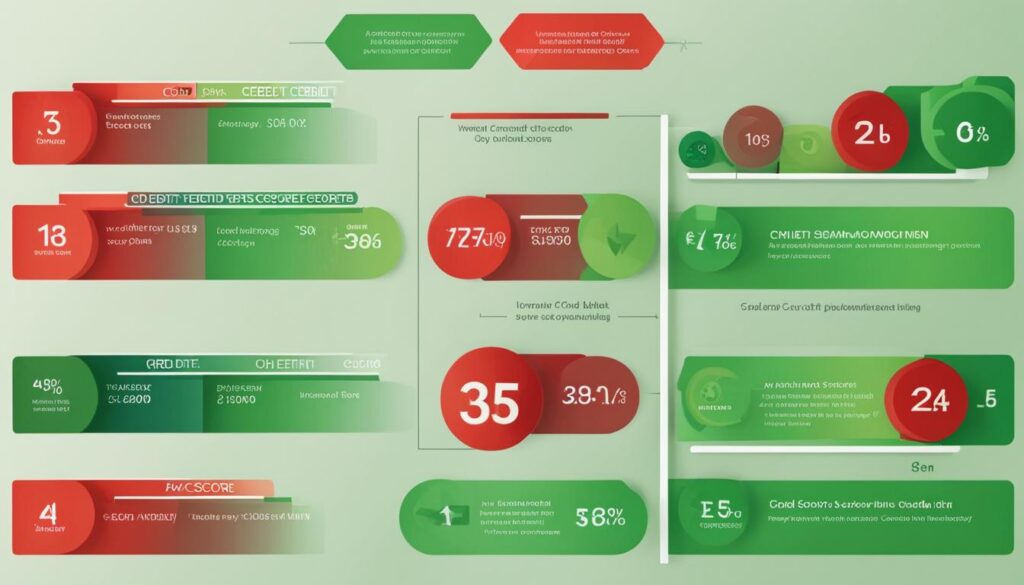When it comes to making financial decisions, having clear money goals is crucial. Whether you’re in your 20s or any stage of life, being goal-oriented can help guide your choices and set you up for long-term success.
In your 20s, there are specific money goals that can have a significant impact on your financial future. These goals include creating a plan to pay off student loans, building an emergency fund, and working towards bigger financial aspirations.
By implementing these smart money moves, you can develop a solid foundation for your financial journey:
Key Takeaways:
- Create a budget to track and manage your income and expenses.
- Build a good credit score to access better financial products.
- Set up an emergency fund to handle unexpected expenses.
- Start saving for retirement as early as possible.
- Pay off debt and develop good money habits for long-term financial success.
Create a Budget and Stick to It
Creating a budget is a crucial aspect of effective financial planning. It allows you to track your income and expenses, giving you a clear picture of your financial situation. By creating a budget, you can effectively manage your spending and avoid overspending.
There are numerous online resources and apps available that can help you create a budget tailored to your specific needs. These tools make it easy to categorize your expenses, set spending limits, and monitor your progress.
When you create a budget, you gain control over your spending habits and improve your financial well-being.
1. Determine Your Income and Expenses
Start by calculating your monthly income from all sources, including wages, investments, and any other sources of income. Next, track your expenses by reviewing your bank statements, receipts, and bills. Categorize your expenses into fixed (e.g., rent, utilities) and variable (e.g., entertainment, dining out) categories.
2. Set Financial Goals
Setting financial goals is an important part of the budgeting process. Whether it’s saving for a down payment on a house, paying off debt, or building an emergency fund, establish clear and achievable objectives.
3. Allocate Funds to Each Category
Assign a specific amount of money to each category based on your income and expenses. Be sure to prioritize essential expenses and savings goals.
4. Track and Review Regularly
Sticking to your budget requires ongoing effort. Regularly review your spending and adjust your budget accordingly. Analyze areas where you may be overspending and find ways to cut back, such as reducing discretionary expenses or negotiating bills.
Remember, creating a budget is just the beginning. The real challenge lies in maintaining the discipline to stick to it. Make budgeting a habit and stay committed to your financial goals. By doing so, you will gain control over your finances and achieve greater financial stability.
Build a Good Credit Score
Building a good credit score is essential for qualifying for the best financial products and getting favorable terms. Your credit score is a numeric representation of your creditworthiness and reflects your ability to manage credit responsibly. Lenders use this score to assess the risk of lending to you and determine the interest rates and terms they offer.
One of the first steps to building credit is to establish a credit history. If you’re new to credit or have a limited credit history, you can become an authorized user on someone else’s credit card or apply for a secured credit card. These options allow you to build credit while minimizing the risk for lenders.
Once you have a credit card, it’s important to use it responsibly. Make regular charges and ensure you pay at least the minimum amount on time. Paying the balance in full whenever possible demonstrates financial responsibility and helps improve your credit score.
Managing your credit responsibly also involves monitoring your credit report regularly. This report contains information about your credit history, including payment history, credit utilization, and account types. Review your report for any errors or discrepancies, and report them to the credit bureau if necessary.
| Credit Score Ranges | Rating |
|---|---|
| 800 – 850 | Excellent |
| 740 – 799 | Very Good |
| 670 – 739 | Good |
| 580 – 669 | Fair |
| 300 – 579 | Poor |
Building and maintaining a good credit score takes time and responsible credit management. By establishing credit, using credit cards responsibly, and monitoring your credit report, you can improve your creditworthiness and have access to better financial products and terms when you need them.
Benefits of a Good Credit Score
A good credit score opens up various opportunities and benefits:
- Access to better interest rates on loans and credit cards
- Higher credit limits
- Favorable terms on financial products
- Potential for lower insurance premiums
- Easier rental approvals and lower security deposits
Take the necessary steps to build and maintain a good credit score to enjoy these benefits and secure your financial future.

Setting Up an Emergency Fund
When it comes to financial stability, an emergency fund is a crucial component. It acts as a safety net, providing a financial cushion to cover unexpected expenses without resorting to debt. Experts recommend saving three to six months’ worth of expenses in an emergency fund to ensure you are prepared for any unforeseen circumstances.
Building an emergency fund may seem daunting, but starting small can make a significant difference. Begin by setting achievable goals, such as saving a certain amount each week or month. For example, saving $20 a week can accumulate to $1,040 in a year. Every little bit counts and taking consistent steps towards your savings goal will bring you closer to financial peace of mind.
Consider keeping your emergency fund in a high-yield savings account. These accounts typically offer higher interest rates, allowing your money to grow over time. While the initial returns may seem modest, the compounding effect will gradually increase your savings, ensuring a more secure financial future.
Benefits of an Emergency Fund
An emergency fund provides numerous benefits, including:
- Financial stability: Having an emergency fund gives you peace of mind, knowing that you have a financial safety net to rely on in times of unexpected expenses.
- Freedom from debt: With an emergency fund, you can cover sudden expenses without having to rely on credit cards or loans, helping you avoid unnecessary debt.
- Flexibility and options: An emergency fund provides you with the flexibility to make decisions based on your needs rather than financial constraints. It gives you the freedom to handle emergencies and unexpected situations without compromising your financial well-being.
By prioritizing the establishment of an emergency fund, you are taking a significant step towards financial security. Building this fund allows you to weather unexpected storms and take control of your financial future.
“An emergency fund is like a financial parachute – it provides security and peace of mind in uncertain times.” – Jane Harris
Explore the table below to understand the recommended amount you should save based on your monthly expenses:
| Monthly Expenses | Recommended Emergency Fund |
|---|---|
| $2,000 | $6,000 – $12,000 |
| $3,000 | $9,000 – $18,000 |
| $4,000 | $12,000 – $24,000 |
| $5,000 | $15,000 – $30,000 |
Remember, building an emergency fund takes time and discipline. Start small and consistently contribute towards your savings. With patience and determination, you’ll create a financial safety net that can provide you with peace of mind and protect you from unexpected financial challenges.

Start Saving for Retirement
Planning for retirement is essential to ensure a financially secure future. By starting to save early, you can take advantage of the power of compound interest and give your money more time to grow. There are several retirement savings options to consider, including employer-sponsored retirement accounts and Roth IRAs.
One of the most popular retirement savings options is an employer-sponsored retirement account, such as a 401(k). These accounts allow you to contribute a portion of your paycheck directly towards retirement savings on a pre-tax basis. Plus, many employers offer matching contributions, which is essentially free money! It’s recommended to contribute at least the percentage matched by your employer to maximize your retirement savings.
If you don’t have access to an employer-sponsored retirement account, or if you want to save even more for retirement, consider opening a Roth IRA. A Roth IRA is an individual retirement account that allows you to contribute after-tax dollars, which means your withdrawals in retirement are tax-free. This can be especially advantageous if you anticipate being in a higher tax bracket when you retire.
Regardless of the type of retirement account you choose, it’s important to start saving as early as possible. The longer your money has to grow, the more time it has to benefit from compounding returns. Even if you can only contribute a small amount initially, it’s better to start saving now and increase your contributions over time.
Benefits of Starting Early
When it comes to retirement savings, time is your greatest ally. By starting to save early in your career, you can take advantage of the power of compound interest. Compound interest is the ability for your investments to generate earnings, which are then reinvested to generate even more earnings. Over time, this compounding effect can significantly increase the value of your retirement savings.
“Compound interest is the eighth wonder of the world. He who understands it, earns it… he who doesn’t, pays it.” – Albert Einstein
Let’s take a look at the difference starting early can make. Imagine two individuals, Sarah and Mike, both planning to retire at age 65. Sarah starts saving for retirement at age 25 and contributes $200 per month until she retires. Mike, on the other hand, waits until age 35 to start saving and contributes $200 per month until retirement. Assuming an average annual return of 7%, here’s how their retirement savings compare:
| Age | Sarah’s Retirement Savings | Mike’s Retirement Savings |
|---|---|---|
| 25 | $0 | $0 |
| 35 | $0 | $0 |
| 45 | $370,883 | $166,326 |
| 55 | $872,806 | $348,777 |
| 65 | $1,731,497 | $658,697 |
As you can see from the table, even though Sarah and Mike contributed the same amount each month, Sarah’s retirement savings significantly outpaced Mike’s due to the extra 10 years of compounding returns.
Now that you understand the importance of starting early, don’t wait! Begin saving for retirement now to ensure a comfortable and financially secure future. Your future self will thank you.

How Can Financial Goals Impact Savings and Investments?
Having a strong savings and investments understanding is crucial in achieving financial goals. By setting clear objectives, individuals can better plan and allocate their resources. Whether it’s saving for a down payment on a house or building a retirement fund, setting financial goals can impact how people save and invest their money.
Pay Off Debt and Develop Good Money Habits
Paying off debt is crucial for achieving your financial goals and securing your future. In your 20s, it’s essential to prioritize debt repayment, especially high-interest debt like credit cards. To start, create a clear and realistic debt repayment plan that fits your budget and includes all outstanding balances.
Consider debt consolidation if you have multiple balances spread across different credit cards or loans. Consolidating your debt can simplify your payments and potentially lower your overall interest rate. This strategy allows you to focus on a single payment, making it easier to track your progress and stay motivated.
Alongside debt repayment, developing good money habits is vital for long-term financial success. Start by spending within your means and avoiding unnecessary debt. By living within your income and resisting the temptation to overspend on credit, you can reduce your reliance on borrowed money and stay on track with your financial goals.
Additionally, monitoring your credit history is important for maintaining a healthy financial standing. Regularly check your credit report to ensure its accuracy, and keep an eye out for any potential errors or fraudulent activities. Building and maintaining good credit will open doors to better financial opportunities in the future.
FAQ
Why is creating a budget important?
Creating a budget helps you track your income and expenses, ensuring you don’t spend more than you can afford.
How can I build a good credit score?
You can become an authorized user on someone else’s credit card or apply for a secured card. Regularly using a credit card, paying on time, and paying in full whenever possible will improve your credit score.
Why is setting up an emergency fund important?
An emergency fund is essential for covering unexpected expenses and avoiding debt.
When should I start saving for retirement?
It’s never too early to start saving for retirement. Take advantage of employer-sponsored retirement accounts like a 401(k) or open a Roth IRA if you don’t have a full-time job yet.
How can I pay off debt?
Make a clear debt repayment plan and consider debt consolidation if you have multiple balances.
What are some good money habits to develop?
Spend within your means, avoid unnecessary debt, and monitor your credit history to develop good money habits for long-term financial success.

